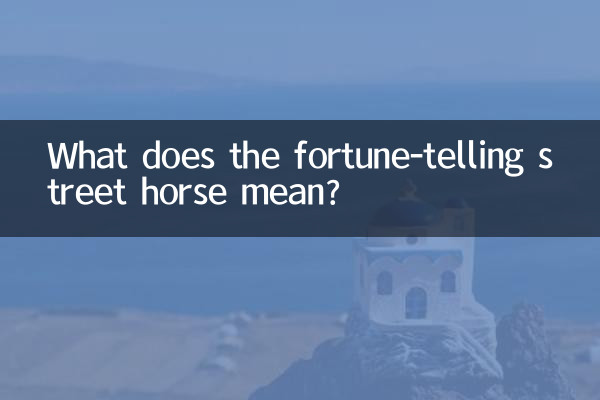What does the fortune-telling street horse mean?
In recent years, the term "fortune-telling and horse racing" has appeared frequently on the Internet, triggering extensive discussions. This article will analyze the meaning of this term based on hot topics and hot content on the Internet in the past 10 days, and explore the cultural and social phenomena behind it.
1. Data analysis of hot topics

The following is the statistics of hot topics and hot content related to "Fortune Telling Street Horse Racing" in the past 10 days:
| keywords | search volume | Main discussion platform | heat index |
|---|---|---|---|
| Fortune Telling Street Horse Racing | 15,000+ | Weibo, Douyin, Zhihu | ★★★★★ |
| fortune telling culture | 8,000+ | Xiaohongshu, Bilibili | ★★★☆☆ |
| The meaning of horse racing in Tianjie | 5,000+ | Baidu Tieba, Douban | ★★★☆☆ |
| Internet fortune telling craze | 12,000+ | WeChat, Toutiao | ★★★★☆ |
2. Analysis of the meaning of "Fortune Telling Street Horse Racing"
"Fortune-telling Street Walking Horse" is an expression that combines traditional fortune-telling culture and modern Internet language. Its literal meaning can be broken down into:
1.Fortune telling: Refers to predicting the future or interpreting destiny through divination, horoscopes, horoscopes, etc.
2.Tianjie: In ancient times, it referred to the street market in the sky. In modern times, it is often used to metaphor the virtual cyberspace.
3.horse racing: Originally refers to riding a horse to travel quickly, now extended to "browsing in a hurry" or "experience quickly".
Taken together, "Fortune Telling Street Walking" can be understood as the behavior of quickly experiencing fortune-telling culture in cyberspace, which reflects the trend of modern people's convenience and entertainment in exploring destiny.
3. Analysis of social phenomena
The popularity of this term reflects the following social phenomena:
1.The rise of online fortune telling: With the development of science and technology, online fortune-telling platforms and APPs are emerging one after another, satisfying people's curiosity for mysterious culture.
2.Fast food cultural consumption: Modern people are more inclined to quickly experience various cultural contents, and fortune-telling in the "flirting" style has become a way of entertainment.
3.The collision of tradition and modernity: The combination of ancient fortune-telling culture and modern Internet language reflects the innovative expression of traditional culture in a new context.
4. Statistics of hotly discussed opinions among netizens
| opinion classification | Proportion | Typical comments |
|---|---|---|
| Entertainment and pastime | 45% | “Just treat it as a game, don’t take it too seriously.” |
| Supporter of traditional culture | 30% | "This is a blasphemy against traditional culture" |
| rational analysis | 15% | "Reflects the spiritual needs of modern people" |
| Others | 10% | “I don’t know what it means at all” |
5. Discussion on cultural significance
The phenomenon of "Fortune Telling Street Horse Racing" has multiple cultural significance:
1.Modern transformation of traditional culture: It shows that traditional culture is adapting to the communication methods of modern society in new forms.
2.The creativity of Internet language: Shows the vitality of netizens in language creation and enriches Chinese expression forms.
3.social psychological refraction: Reflects the ambivalence of people in a fast-paced life who are curious about their destiny but don’t want to delve deeper into it.
6. Forecast of future trends
Based on the current popularity analysis, it can be predicted:
1. Similar combinations of "traditional culture + Internet language" may continue to emerge.
2. The online fortune-telling industry will usher in a new round of development, but regulatory issues also deserve attention.
3. The discussion on how to integrate traditional culture with modern life will continue to heat up.
In short, "Fortune Telling Street Horse Racing" is not only a hot word on the Internet, but also an interesting window to observe the changes in contemporary social culture. Its popularity not only reflects the vitality of traditional culture, but also shows the new characteristics of cultural communication in the Internet era.

check the details

check the details